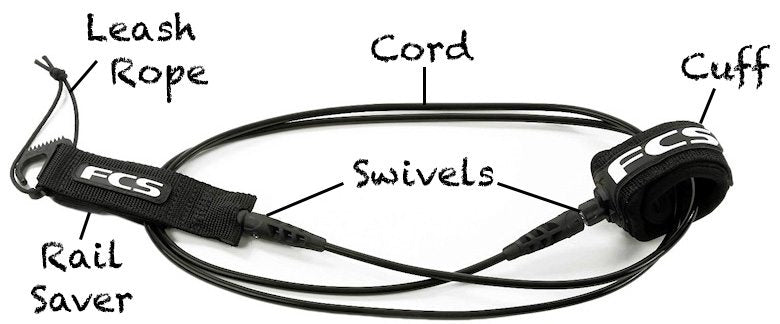Your Cart is Empty
SURF REPORT
How to Choose the Right Surfboard Leash
by Brian Brown May 16, 2017 2 min read
A good quality surfboard leash can mean the difference between catching more waves, or having to swim back to shore in potentially hazardous conditions. The Surf Station carries all different types of leashes, depending on the type of board you ride and the conditions you are surfing in. The general rule of thumb is that your leash should be at least as long as your surfboard.

Shop for Surfboard Leashes
In smaller surf you can use a comp leash that is thinner in diameter, and does not create as much drag. In larger surf, you should use a longer, thicker leash that will allow you to distance yourself from your board, and avoid breaking your leash if you get caught inside by a big set. Check out our own Surf Station brand leashes! Below is a diagram of the different parts of a surfboard leash. The leash rope must be attached to the surfboard leash plug, and short enough so that the rail saver goes over the rail when the leash is pulled backwards towards the nose of the board. This will keep you from damaging the rail of the surfboard. Once the leash rope is installed, attach the leash using the velcro rail saver. Always double-check your swivels after a few sessions, as the bolts have a tendency to back out. You can use a standard fin key to tighten your leash swivel bolts. Before you paddle out, attach the leash cuff to your ankle or calf (just below the knee) at water's edge.
Shortboard Leashes
Typical shortboard leashes are in the 6' to 7' length, attach at the ankle, and can be comp weight for smaller surf or normal thickness for head to overhead surf. Channel Islands makes a bunch of popular models in the hex cord construction. Dakine shortboard models are the Pro Comp and the Kainui Team. FCS also offers a Comp Surfboard Leash and Regular Surfboard Leash.Longboard Leashes
Longboards require a much longer leash for safety, and attach at the ankle or calf. Check out our longboard leashes from Dakine, FCS, or Komunity.Leave a comment
Comments will be approved before showing up.

